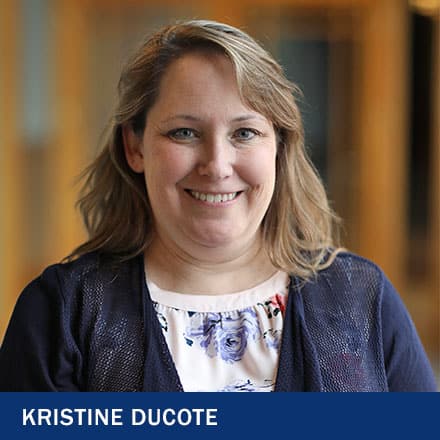Academic Spotlight: Dr. Laman Tasch, Associate Dean of Academic Strategy, Social Sciences
Social Sciences | 7min Read

If questions like "What leads to deviant behavior?" and "How does someone go from antisocial to sociopath?" pop into your brain on a regular basis, you may have found your perfect degree. Southern New Hampshire University's online Bachelor of Science (BS) in Criminal Justice with a concentration in Criminology and Crime Analysis program explores these questions — and many more.
Once enrolled, you'll learn how to use criminology theory to develop crime reduction and prevention strategies from faculty who've served on the front lines. Armed with this specialized knowledge, you can position yourself for success in law enforcement, social services and other related fields.

Prepare for an intense exploration of the criminal mind, with class topics ranging from theories of crime and punishment to the psychological and social basis of criminal behavior. Your critical thinking and communication skills will be sharpened as lessons open new windows into rehabilitation and recidivism, studies of specific types of crime, and social attitudes and policy.
You'll gain a strong foundation in essential criminal justice principals, plus specialized knowledge from 4 concentration-based classes.
Visit the course catalog to view the full BS in Criminal Justice - Criminology and Crime Analysis curriculum.
All undergraduate students are required to take general education courses, which are part of SNHU's newly redesigned program, The Commons. The goal of The Commons' curriculum is to empower you with some of the most in-demand skills, so you can succeed not only in your academic career, but in your personal and professional life too.
Minimum Specifications:
Additional Information:
SNHU has provided additional information for programs that educationally prepare students for professional licensure or certification. Learn more about what that means for your program on our licensure and certification disclosure page.
If you've completed a basic police, corrections, or probation and parole academy training, you may receive up to 12 credits toward your criminal justice degree at SNHU. This will save you time (and money!) on your way to graduation.
Our no-commitment application can help you decide if SNHU is the right college for you and your career goals. Apply up until 2 days before the term starts!
Upcoming term starts: May 4, 2026 | June 29, 2026
Attending college online at SNHU can be a life-changing experience. In fact, 93.4% of online students would recommend SNHU according to a 2025 survey with 8,718 respondents.
SNHU instructors like Dr. Hector R. Garcia are at the heart of SNHU's mission of student success. With real-world criminology experience and passionate dedication to our students and their learning, our faculty are with you every step of the way.
 Dr. Hector R. Garcia
Dr. Hector R. GarciaIn addition to his work in academia, Dr. Hector R. Garcia has spent over 30 years in law enforcement and security. He’s trained thousands on topics like emergency management and worked with international partners on the development of public safety and security initiatives.
Position
Associate Dean, Social Sciences
Joined
SNHU 2018
Education
Read more about Dr. Hector R. Garcia and other online faculty at SNHU.
You’ll take your courses within SNHU’s Brightspace platform. This is where you’ll find your:

At Southern New Hampshire University, you'll have access to a powerful network of more than 400,000 students, alumni and staff that can help support you long after graduation. Our instructors offer relevant, real-world expertise to help you understand and navigate the field. Plus, with our growing, nationwide alumni network, you'll have the potential to tap into a number of internship and career opportunities.
Recently, SNHU has been nationally recognized for leading the way toward more innovative, affordable and achievable education:
Founded in 1932, Southern New Hampshire University is a private, nonprofit institution with over 250,000 graduates across the country. SNHU is accredited by the regional accreditor New England Commission of Higher Education (NECHE), which advocates for institutional improvement and public assurance of quality.
No application fee. No test scores. And no college essay. Just a simple form with basic information. It’s another way SNHU helps you reach your goals sooner.
It's easy, fast and free.
Whether you're applying for an undergraduate or graduate degree, you’ll fill out a form to verify your previous education experience. As part of our admissions process, we'll help you request transcripts from your previous school(s) to see if you can transfer any credits into your SNHU program! (Also for free!)
After reviewing your official evaluation, you can decide if SNHU is right for you! If you choose to enroll, just pick your start date and get ready for classes to begin.
Talk to an admission counselor: 888.327.SNHU | enroll@snhu.edu
SNHU is accredited by the regional accreditor the New England Commission of Higher Education (NECHE). The university also carries specialized accreditations for some programs.

As a nonprofit university, SNHU offers some of the lowest online tuition rates in the country. And when you work with our Financial Services team, we'll explore ways to help you save even more on your education – and customize a payment plan that works for you.
*before previously earned credits are applied
Tuition rates are subject to change and are reviewed annually.
**Note: Students receiving this rate are not eligible for additional discounts.
Additional costs: Course materials vary by course.
If 30 of your prior learning credits ($342/credit) are accepted toward your bachelor’s degree.
Your remaining tuition cost: $30,780
If 45 of your prior learning credits ($342/credit) are accepted toward your bachelor’s degree.
Your remaining tuition cost: $25,650
If 60 of your prior learning credits ($342/credit) are accepted toward your bachelor’s degree.
Your remaining tuition cost: $20,520
If 75 of your prior learning credits ($342/credit) are accepted toward your bachelor’s degree.
Your remaining tuition cost: $15,390
If 90 of your prior learning credits ($342/credit) are accepted toward your bachelor’s degree.
Your remaining tuition cost: $10,260
How we estimate your tuition cost:
We look at the cost per credit multiplied by the number of credits you need to earn for a bachelor's degree. Most bachelor's degrees require 120 credits. SNHU allows you to transfer in up to 90 credits, requiring a minimum of 30 credits to be taken at SNHU. This is only a tuition estimator, and doesn't account for other fees that may be associated with your program of choice.
Transfer up to 90 credits toward your bachelor's degree program at SNHU. If you’ve taken one course or many, we’ll evaluate them for you.
Fill out the FAFSA to see if you’re eligible for grants or work-study. (You could also be offered loans, though you’ll have to pay those back later.)
Earn credits in leadership, technology and more – while taking advantage of tuition discounts for active-duty service members and spouses.
Getting free money for college – from SNHU or an outside organization – could help you save hundreds or even thousands of dollars.
Bring in credits from popular options like CLEP, Sophia Learning, Google and other common credit for prior learning (CPL) experiences.
Learn how you can save money with tuition reimbursement from your employer.
Take advantage of an online tuition discount through your organization’s partnership with SNHU. Check with your employer to see if your organization partners with us and if you’re eligible for additional tuition savings and partner education benefits.
As part of one of the largest and most popular criminal justice programs in the U.S., Southern New Hampshire University's online criminology degree was built to help set you up for success in the field.
With each course, our goal is to help you identify where you belong in a vast array of employment opportunities. Thanks to the degree's versatility, you can put your skills to use in an area you feel truly passionate about, like policing, corrections, human services and homeland security.
By earning your online degree in criminology, you'll be well positioned for fast growing career paths in the field, including:
Focus on the public well-being of children, homeless people, older adults or veterans, or help people with substance use or mental health disorders.
Gather facts and collect evidence for criminal cases, observe the activities of suspects and make arrests.
Read more about how to become a detective.
Supervise people placed on probation or develop rehabilitation plans for people on probation or parole.
Increase nationally in roles for social and community service managers through 2032, projected by the U.S. Bureau of Labor Statistics (BLS).1
Median annual pay nationally for social and community service managers as of May 2023, according to the BLS.1 Statistic not based on wage data for SNHU graduates.
Understanding the numbers
When reviewing job growth and salary information, it’s important to remember that actual numbers can vary due to many different factors—like years of experience in the role, industry of employment, geographic location, worker skill and economic conditions. Cited projections are based on Bureau of Labor Statistics data, not on SNHU graduate outcomes, and do not guarantee actual salary or job growth.

You can, and there are plenty of reasons you should. Flexibility might be the biggest if you’re working in the criminal justice field full time – especially if you’re doing shift work.
Even if you’re not working full time, online education offers many benefits. That’s one of the reasons so many people opt to become online students. Our online criminology and crime analysis courses follow our undergraduate schedule of six 8-week terms per year. You'll take 1 or 2 courses per term. At SNHU, the majority of your classmates will be working students.
The online criminology and crime analysis degree, like all of our online degrees, gives you the flexibility to create your own schedule. That’s because there’s no set time you need to be in front of your computer to participate in class. Each week, you log in when you can and complete your assignments on your schedule. Then, you simply turn them in by your weekly deadlines – typically Thursday and Sunday nights.
 Shelly Villa ’19, a military spouse and mother of four, chose SNHU’s online criminology degree to finish what she’d started after high school. She knew that by attending school online, she could still be there for her daughters.
Shelly Villa ’19, a military spouse and mother of four, chose SNHU’s online criminology degree to finish what she’d started after high school. She knew that by attending school online, she could still be there for her daughters.
She also liked the program’s diverse array of classes.
“I had never really thought about the juvenile court system before,” Villa said. “Then I took the class for the juvenile system, and I said, ‘Hey, this is something I’m actually really interested in.’”
What’s motivating you? Whether you want to get into law enforcement, corrections, social services or go on to teach criminal justice, SNHU’s criminology degree is worth a closer look.
Whether your goal is to break into the criminal justice field or you’re looking to advance in your current role, you have lots of options.
Earning your criminology and crime analysis degree online at SNHU can help you grow specialized skills that can make you stand out to employers. By combining a foundation in criminal justice with the data-savvy skills of crime analysis, you'll be positioned for success in a diverse array of career paths, including:
Kelcey Kennedy '19 '21G went on to earn a master's in psychology after finishing her criminology program to position herself for her dream career.
"I want to be able to work with inmates to rehabilitate them back into society," she said. "Upon completing my degrees, I now have that opportunity."
Learn more about some of the types of criminal justice career paths.
Many schools offer criminology programs, but only you can decide which one is best for you. You’ll need to consider whether the program fits your budget, schedule and career plans, among other things.
SNHU’s criminology and crime analysis degree is one of the most affordable in the nation. It also offers the flexibility of an online degree. The combined enrollment in our criminal justice college degrees – including associate, bachelor's and master's programs – tops 7,000 students. Our faculty members bring real-world experience from all aspects of law enforcement to the classroom.
The program is also notable for its curriculum, which marries the latest criminology theory with practical crime analysis skills. This prepares graduates with an education that can set them apart in a competitive market.
Southern New Hampshire University also gives you access to online student groups like the Law and Disorder Club. The club hosts networking and educational events like Serial Killer Month, featuring trivia about serial killers, and a Cold Case Mystery Party.
 Kristine Ducote, one of the founders of the club, said the networking between members and criminal justice professionals is one of the main advantages of joining the club.
Kristine Ducote, one of the founders of the club, said the networking between members and criminal justice professionals is one of the main advantages of joining the club.
“We meet different professionals in the field,” Ducote said. “You start networking (and) it can help you land a job you want or get your career going in the direction you want to go.”
Ducote started the club to help students get more from their programs and, ultimately, land a job in criminal justice.
“I want these students to go out and succeed, and I want them to go out and have what they need before they graduate,” she said. “It’s very important to me because we address issues that really need addressing.”
That depends partly on your career plans and partly on your ultimate educational goals.
Want to use your bachelor’s in criminology to pursue a traditional path in law enforcement as a detective? According to the U.S. Bureau of Labor Statistics (BLS), police and detectives made median annual wages of $74,910 in 2023.1
If you want your criminology degree to lead to work in the prison system as a probation officer or correctional treatment specialist, know that the BLS reported median annual wages of $61,800 in 2023.1
Is working for the public well-being what you aspire to? Social and community service managers made a median annual wage of $77,030 in 2023.1
Is victim advocacy where your passion lies? The BLS reported a median annual wage of $58,380 for social workers who help victims of crimes in 2023.1
Of course, an advanced law enforcement degree can increase your earning potential. SNHU offers the MS in Criminal Justice with 2 concentrations – counterterrorism and homeland security and public administration.
If you're not ready to take on a full graduate program, you can also strengthen your resume – and collect credits you can later apply to your master's degree – with a graduate certificate in counterterrorism.
The criminology degree is versatile and meaningful. You can take it in several directions, from traditional law enforcement roles to working in the prison system or social services.
As you complete your criminology and crime analysis courses, you’ll develop the skills and knowledge to succeed in law enforcement, social services and related fields. And you’ll gain something just as vital – a better understanding of people.
Ian Moffett, retired chief of the Miami-Dade school system and an adjunct instructor at SNHU, spoke about the importance of empathy in criminal justice after the death of George Floyd in May 2020. Lending his expertise on a panel hosted at SNHU, Moffett said, “Studies show that people with higher education, people who have degrees, have better problem-solving skills. They’re more empathetic.”
Regardless of your career goals, the empathy and communication skills at the core of this program will help you achieve them.
Criminology is a great career choice, especially if you’re passionate about protecting the nation’s citizens from crime or serving the public good.
Laurie Nuzzo, SNHU criminal justice faculty and FBI investigative specialist, said a degree in criminology can help lead to a more fulfilling career. She has many students who believe they’ve learned how to communicate better with people through their studies.
Want to earn your degree, but can't currently commit to requirements of a bachelor's? Most full-time students can complete our associate degree in criminal justice program in two years. Part-time students, many of whom work full time, are encouraged to work at their own pace. Once you've earned your associate degree, you can seamlessly start work on the remaining 60 credits for your bachelor's degree.
Read more about what you can do with a criminology degree.
SNHU's online Bachelor of Science in Criminal Justice with a concentration in Criminology and Crime Analysis is uniquely designed to help prepare you for success as a crime analyst.
Developed by industry experts who understand the demands of today's workforce, this specialized degree offers a perfect path for a crime analyst – whether you're just starting your career or ready to make a change.
Becoming a crime analyst requires the right balance of criminal justice, research and data analytics skills. To this end, a bachelor's degree – while not always required – may be a powerful way to break into the field.
SNHU's online criminology and crime analysis degree is uniquely designed to help grow this very specific skill set. On one hand, you'll get the foundation you need to succeed in a protective service occupation. On the other, you'll gain competence with data analytics – which is itself a high-demand skill in just about every imaginable industry.
Real-world experience and on-the-job training are also helpful. Those with a background in law enforcement, for example, can gain practical knowledge that may position them for successful crime analysis careers.
Plus, those with law enforcement training could transfer their experience for up to 12 college credits at SNHU – saving you time and tuition.
Put simply, crime analysis is designed to predict and prevent criminal behavior. It achieves this goal through the analysis of a wide variety of data, which then informs strategic solutions to help reduce crime and protect communities.
"Crime analysts need to learn quantitative and qualitative techniques, to analyze data and develop crime prevention and intervention models," said Mahmut Cengiz, an SNHU adjunct professor and senior data analyst.
"Crime has a pattern. Crime analysis, instead of relying on law enforcement approximations, uses statistical prediction to identify the most probable areas for urgent police intervention," he said.
1Bureau of Labor Statistics, U.S. Department of Labor, Occupational Outlook Handbook, on the internet, at:
Cited projections may not reflect local and/or short-term economic or job conditions and do not guarantee actual job growth.